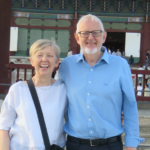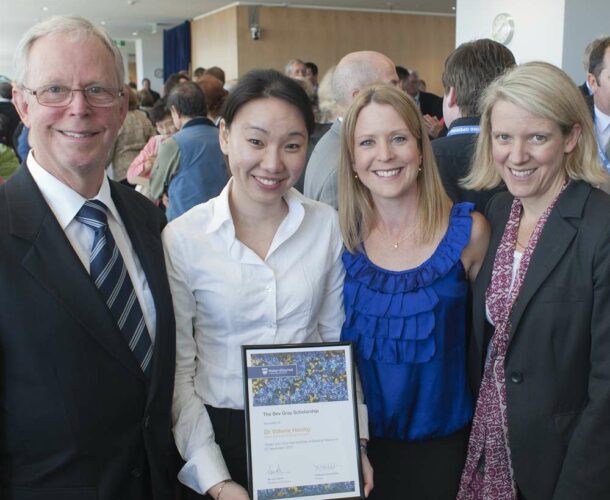The Bev Gray Ovarian Cancer Scholarship is established to support young researchers working to develop diagnosis methods and treatments for ovarian cancer. Dr Valerie Heong, an institute PhD student, was the first recipient of the award. Heong is a medical oncologist; her research strives to develop novel treatment strategies.
Seeking advice from the director
One morning in the spring of 2011 Katya Gray, then an administrative assistant with the Walter and Eliza Hall Institute’s Bioservices unit, was in the tea room when she approached the director, Professor Doug Hilton, for some personal advice.
Back when Katya first joined the institute in 1997 she was an animal technician. For over a decade she had bred and maintained the laboratory mice that are critical to the institute’s research, including for Hilton’s projects. So they had collaborated often and become friends.
Katya told him that her mother, Bev, had been battling ovarian cancer for nine years but she was exhausted and so too were the medical options open to her. Bev had made the decision to transition from curative to palliative care. Now, in characteristically indomitable form, she was planning her own funeral.
Scholarship to support young researchers
She wanted no flowers, preferring to be remembered with donations that might assist efforts to beat the disease she had railed so hard against. Katya was looking for suggestions as to how to make that happen. “I hoped it would be a casual conversation, but of course I broke down,” she recalls.
When Bev Gray passed away in February 2012, mourners were invited to donate to the institute’s ovarian cancer laboratory. And the institute at its own initiative used the collection as seed money to launch the Bev Gray Ovarian Cancer Scholarship in partnership with Ovarian Cancer Australia, to support young researchers.
The memorial has provided some comfort and powerful motivation to Katya, her sister Miranda Bailey and their father Tony. Having all come to learn more than they could ever wish to know about the stealthy cruelty of the still too-hidden disease, they have chosen to share their knowledge as advocates for awareness and research into ovarian cancer.
Diagnosis, a bolt from the blue
The diagnosis that changed their lives, back in 2003, came as a bolt from the blue, as it too often does. Bev Gray was a vibrant, healthy 56-year-old, just retired from her career as a special needs teacher and just returned from a trek through the outback of Central Australia.
A nurse she befriended on the trail copied her into a group email urging her women friends to ask their doctors to check their CA-125 levels next time they had a checkup. These can be a marker for certain cancers. Bev’s GP wasn’t keen, arguing that there was no cancer history in her family. Bev insisted.
The results came back showing sharply elevated levels. Further investigation revealed she had stage three ovarian cancer, which had spread into her lymphatic system. It’s spread from there was slow but relentless.
Raising awareness of ovarian cancer and its symptoms
On reflection the signs seemed obvious. A few years earlier Bev had been diagnosed with irritable bowel syndrome after suffering bloating, fullness and abdominal discomfort. Menopause further confused the picture. Miranda remembers her mother sometimes being so knotted up after a meal that she would stretch out on the floor to try to get relief.
This is one of the anecdotes Miranda often shares in talking to women about the signs and symptoms they should heed. The Gray sisters have become tireless ambassadors for Ovarian Cancer Australia (OCA), sharing their experience supporting their mother with other families and doing advocacy at every opportunity. There’s a lot of work to do.
“I was rattling the tin at the basketball recently and a lady came and said to me ‘oh my aunt died of ovarian cancer, I’m right behind the cause’,” Miranda says. “And as she put her money in the bucket she said ‘I’m good, I have my pap smear every two years’. I said ‘you do know that a pap smear doesn’t detect for ovarian cancer? Would you like a brochure to read?’ She probably felt sick the whole game.”
Connecting the community to research
Miranda has enlisted the company she works for, Noel Jones Real Estate, as a major partner and fundraiser for fundraiser for OCA, donating a portion of sales, and with all staff and company advertising displaying the cause’s teal ribbon to build awareness. She seizes opportunities to talk to people who question her daily about what the teal ribbon signifies. It is to ovarian cancer what the pink ribbon is to breast cancer, but community recognition has a long way to go.
Meanwhile Katya draws on her experience in her new role as coordinator of institute’s consumer advisory panel, established to better connect the institute’s research with community experiences of disease and consumer expectations.
Institutional medicine is perceived – often accurately – as clinical and remote. And there are times patients and their carers might be grateful for a bit of distance. But allowing humanity and individual recognition into the mix can be transformative for patients and families, as the Grays can attest.
“The Walter and Eliza Hall Institute for me is family. That’s how this makes me feel, that I have been looked after,” says Katya. “The scholarship is an ongoing gift for us, to remember. And we are so grateful.”







